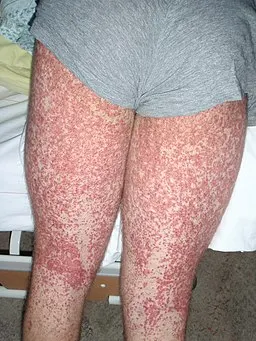Vasculitis in Children | Clinical features, and management of HSP
Table of Content
- Classification of pediatric vasculitis according to vessel size
- Clinical features of HSP - Frequency wise
- Management
- Complications of HSP
- Points to remember
- DP Video wrap
DNB Questions asked
- Classify vasculitis Outline management of HSP including its complications Marks - (3 + 3 + 4)
- Classify vasculitis based on the size of involved vessels and give examples of each category Describe etiology, clinical features, and management of Takayasu’s arteritis
(09/2)5+5 - HSP- clinical features and diagnosis June 2018 Marks - 5
Classification of pediatric Vasculitis based on the size of involved vessels
1. Predominantly large vessel vasculitis
- Takayasu arteritis
2. Predominantly medium vessel vasculitis
- Childhood polyarteritis nodosa
- Cutaneous polyarteritis nodosa
- Kawasaki disease
3. Predominantly small vessel vasculitis
Small vessel vasculitis can be further classified as
A. Granulomatous:
- Wegener granulomatosis
- Churg-Strauss syndrome
B. Non-granulomatous:
- Microscopic polyangiitis
- Henoch-Schonlein purpura
- Isolated cutaneous leukocytoclastic vasculitis
- Hypocomplementemic urticarial vasculitis
4. Other
- Behcet disease
- Vasculitis secondary to infection (including hepatitis B–associated polyarteritis nodosa), malignancies, and drugs, including hypersensitivity vasculitis
- Vasculitis associated with connective tissue disease
- Isolated vasculitis of the central nervous system
- Cogan syndrome
- Unclassified
Henoch-Schonlein purpura
HSP is the most common vasculitis affecting children
What are symptopms of Henoch-Schonlein purpura (HSP)
Mechanism
widespread leukocytoclastic vasculitis from IgA deposition in blood vessel walls leads to clinical features
1.Rash (100% of cases)
- Classical sign
- Purpura, classically palpable, no itchy Starts with legs and buttocks
- Occur in absence of thrombocytopenia!
- May Occur after a brief urticarial rash

|
| Image.1 - HSP rash - Notice the distribution |
2.Arthritis (75% of cases)
- Self-limiting and non-deforming
- But severely painful
- knees and ankles are Commonly involved
3.Abdominal Pain (65% of cases)
- Colicky pain, vomiting
- May mimic acute surgical abdomen
- Easily confused with intussusception
- Intussusception is also a complication (6%)
4.Nephritis (occurs in 40% of cases)
- Hematuria is the most common feature of HSP nephritis
- Many have gross hematuria
- Can lead to chronic renal issues
5.Edema
Edema of the scalp, eyelids, back, feet, and/or perineum
Management of HSP
½ marks x 6 = 3 marks
1.General management
- Mainly supportive care
- Analgesia may be achieved by NSAIDs
2.Steroids - Indication of steroids in HSP
- Significant gastrointestinal involvement
- Renal involvement
How to give steroid in HSP?
- Prednisolone (1 mg/kg/day for 1 to 2 wk, followed by a taper)
- Reduces abdominal and joint pain but does not alter overall prognosis nor prevent renal disease
3.For severe disease
Intravenous immune globulin (IVIG) and Plasmapheresis have been tried.
4.chronic HSP renal disease
Chronic disease is managed with immunosuppressants like -
- Azathioprine
- Cyclophosphamide
- Mycophenolate Mofetil
Complications of Henoch schonlein Perpura
1 marks x 4 = 4 marks
Gastrointestinal
- Intestinal perforation is an immediate complication
- Intussusception (ileoileal)
- Acute pancreatitis
- Bowel Infarct
Renal
- HSP nephritis - Major long-term complication ( Occurs in 1-2% of children with HSP)
- Proteinuria
- End-stage renal disease (1%)

Cardiovascular
Hypertension Children with HSP should undergo serial monitoring of blood pressure and urinalyses for 6 months after diagnosis, especially those who presented with hypertension or urinary abnormalities
CNS
- Seizures
- CNS bleeding
- Mononeuropathies

More frequently asked questions
Further reading
- Pediatric Vasculitis. Pediatr Clin North Am. 2012 Apr; 59(2): 407–423. (full article)
- HSP Guidelines -Royal children Hospital Melbourne (Good read for diagnostic approach)
- Vasculitis in Children - Despina Eleftheriou, Ezgi Deniz Batu, Seza Ozen, Paul A. Brogan, Vasculitis in children, Nephrology Dialysis Transplantation, Volume 30, Issue suppl_1, April 2015, Pages i94–i103,
Image [Source 1] - Wikimedia commons
Author

Shailesh Gophane | DCH DNB Pediatrics
Shailesh completed his Pediatric residency from Port Trust Hospital Mumbai after completing DCH from J.J. Hospital, Mumbai
💡 Join the Discussion!
🩺 Help us refine this article — share corrections or additional information below. Let's elevate the accuracy of knowledge together! 💉💬